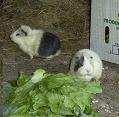 |
Bungala Ridge Permaculture Gardens REDUCE ... REUSE ... RECYCLE ... REPAIR ... RETURN ... REVEGETATE ... REPLENISH |
||||||||
|
|||||||||
|
|
Life Without a Fridge It is difficult to imagine living without a fridge, yet hundreds of millions of people around the world do, everyday. Very few people in our privileged and modernised society would choose to live without a fridge, generally considered absolutely essential to survival. Our family is one of those few! Recently the owner of the local supermarket asked me incredulously - 'How do you survive?' How did anybody survive a hundred years ago? How did the human race evolve without fridges? - I thought to myself. But my polite reply gave him the information he needed to be able to understand my particular brand of 'insanity'. The reasoning behind it both convinced and educated him. Living without a fridge is a workable alternative. A lady once confessed to me in 1983 when paying her power bill - 'The Electric Light' bill as she called it - that connection to the grid had only come to her house in the early seventies. Before that they relied on the kero fridge and oil lamps.... Before that, she remembered the weekly visit of the 'ice man', with his huge blocks of ice.... I wondered what her mother had used to keep the food safe to eat, but the next customer rushed us on.... The decision for us to live without a fridge was an economic one at first. The day finally came when we moved onto our property, to build our dream home, complete with solar and wind power generators to provide the electricity. Such alternative power systems are expensive, but not as expensive as the specialised electrical appliances required, especially fridges. We could have bought a gas fridge, but they use a non-renewable resource, and we were naive environmental purists back then. An ordinary 240 volt fridge would have meant a much heavier duty invertor and resultant power drain, again an expensive option. Cautiously we opted for trying life without a fridge until we could afford a 12 volt one. Eight years later we still don't have one, and see no need to ever buy one! Not having a fridge is made easier by living within twenty minutes walking distance to the supermarket and butcher. Fresh food is bought and consumed daily. For people living in remote locations, where the use of a car is necessary for obtaining food supplies, a refrigerator would make life a lot easier. But still not essential. Growing a lot of our own vegetables and fruit, and changing to a diet based on locally produced, seasonal and fresh food, helped us adjust. Our eating patterns changed too; we tended to eat when we were hungry, relying less on fixed meal times except for dinner, a family social time together. Our menus became simpler, and made more use of seasonings to add variety to basic main dishes. We stuck to our motto at the time, borrowed from a popular magazine; live simply and simply live. The change in shopping patterns didn't detract from the time-honoured practice of planning menus in advance - a great money saving tactic and essential for living on a low income. However, I do need to exercise extra diligence to resist impulse buying each day when I'm in the supermarket! Managing the pantry is easy. Meat and dairy products are used the same day they are purchased, although cheese and yoghurt have kept overnight when stored in a cool place. UHT soymilk, favoured over dairy milk, is generally opened and used the same day. Eggs keep well in the cupboard. Fruit and vegies last up to a week depending on type, and are kept on the bench, in sight, tempting passer-bys to eat them! The potatoes, and other light sensitive vegies are kept in a wonderful stainless steel fifteen litre container with a lid, which doubles as a preserving pan when needed. A stock of preserved food, both canned, bottled, and dried, complete the pantry, and help out on days I can't get down to the shop. Eventually we hope to build a 'cool' cupboard for food storage, and an earth bermed 'cool' room (which will also provide us with wildfire protection). The cool cupboard has been successfully integrated into homes in Australia, and uses the principle of drawing cool air from the underfloor space, or through a specially built cooling tunnel, up through wire racks of food in the cupboard, and finally vented through the roof. A fan can be used to assist the natural convection currents, if needed. We once tried to set up a 'Coolgardie Safe', which uses the principle of evaporative cooling, but found it more trouble than it was worth. We also nearly bought a car fridge, but stopped short because of concerns about the depletion of the ozone layer, and the role refrigerators play in its demise. On those really hot days when thoughts of ice and cold drinks are compelling, we dig out the old recycled polystyrene broccoli box, buy a $1-50 bag of ice, and live it up! Experience has shown us that when placed in a shaded part of the kitchen the ice lasts up to twenty-four hours. On average we buy about a dozen bags of ice each summer. Much cheaper than the cost of electricity for a refrigerator! These passive solar options for food storage encourage us on many levels, as they don't produce green house gases, and help us get in touch with a more natural way of living. Some of the facts that keep us determined to continue living without a fridge include the knowledge that food is kinder on the stomach when consumed at room temperature - excessively hot and cold foods are not good for the digestive system. In addition, I no longer have to clean out mouldy, forgotten leftovers from a smelly fridge, a job I always hated but could never seem to avoid. I also never have to worry about spoiled food if the power fails, or the fridge breaks down. Food rarely sits in my cupboards for long - I am not tempted to think food has a longer shelf life because it is refrigerated. It may last longer in the fridge, but what about the nutritional value? Better to eat fresh. Not living with a fridge has forced us to consider many aspects of food storage and nutrition we would have paid scant attention to before. It has shown us a way to be more responsible for what we put into our bodies. Over 1,000 new food products hit the markets each week in Europe, and the figure is probably similar in Australia. Such a smorgasbord of choice, all with clever advertising campaigns behind them, can become confusing to the average person shopping for a family. We are forced to rely on 'experts', and these experts are all too often funded by the very companies producing the food! Living without a fridge is not for everyone. But it is possible.
|
Hot Links!
This site is sponsored by
|
|||||||
|
|
|
|
|||||||




